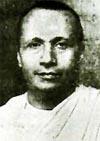Biography
Jaishankar Prasad (Hindi: ?????? ??????), one of the most famous figures in modern Hindi literature as well as Hindi theatre.
Biography
Jaishankar Prasad was born on January 30, 1889, in an elite madheshiya vaisya family in Varanasi, Uttar Pradesh, India. His father Babu Devki Prasad, also known as Sunghani Sahu (?????? ????), was a tobacco dealer. After, he lost his father at an early age, he had to encounter some family problems at a relatively young age, and left school after class eight. However, he remained interested in literature, languages, and ancient history, and continued studying at home; thereafter he developed a special inclination towards the Vedas and these interests are innately reflected in the deep philosophical contender/content of his works.
Language and influence
His initial poetry (Chitraadhar collection) was done in the Braj dialect of Hindi, but later he switched to the Khadi dialect or Sanskritized Hindi.
In his earlier days, he was influenced by Sanskrit dramas, but later the influence of Bengali and Persian dramas is evident on his works. Prasad's most famous dramas include Skandagupta, Chandragupta and Dhruvaswamini .
Poetic Style
He is considered one of the Four Pillars (Char Stambh) of Romanticism in Hindi Literature (Chhayavad), along with Sumitranandan Pant, Mahadevi Verma, and Suryakant Tripathi 'Nirala'. His style of poetry can at best be described as "touching". Art and philosophy have been exquisitely amalgamated in his writings. His vocabulary avoids the Persian element of Hindi and mainly consists of Sanskrit (Tatsama) words and words derived from Sanskrit (Tadbhava words) - some of them made really exquisitely by himself. By this means, he arrives at a sophisticated diction that was typical for Hindi Romanticism of the 1920s and 30s, and also, on the Urdu side, for Muhammad Iqbal.
The subject of his poetry spans the entire horizon of subjects of his era, from romantic to nationalistic. He in a way signifies the epitome of classical Hindi poetry. One of his patriotic poems, 'Himadri Tung Shring Se', won him many accolades in the era of Indian independence movement. However, Kamayani undoubtedly remains his best creation.
Dramas and other Writings
His dramas are considered to be most pioneering ones in Hindi. The majority of them revolve around historical stories of Ancient India. Some of them were also based on mythological plots. In 1960s, Shanta Gandhi Professor of Ancient Indian Drama at while at National School of Drama, revived interest in Jaishankar Prasad?s plays for modern Indian theatre, by successfully staging his most important play Skanda Gupta written in 1928, with little changes to the original script, thus quashing doubts over its "stagability".
He wrote short stories as well. The subjects were mixed - ranging from historical and mythological to contemporary and social. Mamta (motherly love) is a famous short-story based on an incident where a Mughal Badshah gets refuge in a Hindu widow's home whose father was killed by Badshah's army. Another one of his well-known short-stories called chhota jadugar (little magician) portrays the life of a child who learns to earn his own living by performing small skits with his dolls on streets.
He also wrote a small number of novels. ..






